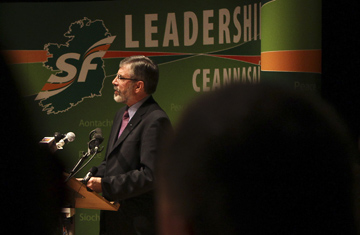
Sinn Fein president Gerry Adams speaks to the media regarding his party's manifesto in Belfast
The theme tune said it all. Before the first-ever televised election debate between Northern Ireland's party leaders on April 22, viewers heard "Two Tribes," an antiwar song by 1980s pop band Frankie Goes to Hollywood. In Northern Ireland, two tribes have been warring for decades. Today the fighting is mostly political, but votes are still cast along sectarian lines. In the May 6 election, most Catholics will vote for nationalist parties and most Protestants for unionist parties, as they have done for generations. But despite these age-old ties, new alliances — as well as some new feuds — have added an element of intrigue to the 2010 campaign.
Squeezed into the backbenches at the House of Commons, Northern Ireland's 18 MPs are among the wallflowers of Westminster. Together they occupy fewer than 3% of the total seats in the Commons and represent political parties that are found nowhere else in the U.K. And recent progress in Northern Ireland's peace process has reduced Westminster's role in the province. The devolution of most political powers from London to Belfast means that education, policing, health and other matters are now administered by Northern Ireland's own parliament at Stormont.
But Northern Ireland's Westminster MPs could still play a key role in determining the shape of the next British government. If, as recent polls indicate, the Conservatives fail to win an outright majority, they will have to vie for the support of smaller parties — including those of Northern Ireland's MPs — to function as a minority government. (It's happened before. In the 1990s, with the strength of support among its own MPs fading, the Conservative Party relied on the backing of unionist legislators to bolster its majority.)
Some alliances are already in place. The Protestant-backed Ulster Unionist Party formed an electoral pact with the Conservatives last year and is fielding local candidates under the banner of Ulster Conservatives and Unionists New Force (UCUNF). The arrangement has proved controversial and has already cost the party its only incumbent MP at Westminster. Sylvia Hermon, MP for the North Down constituency, resigned from the party in March over the Conservative linkup and is likely to retain her seat as an independent.
Northern Ireland's largest party at Westminster is the Democratic Unionist Party (DUP). Led by Peter Robinson, the DUP faces a challenge in its rural, Protestant heartland from the hard-line Traditional Unionist Voice (TUV), a party that opposes the province's power-sharing government arrangement between Catholics and Protestants. Formed in 2007, the TUV has never previously contested a Westminster election, but it will hope to win votes from former DUP supporters dismayed by a recent spate of scandals.
In January, Peter Robinson temporarily stood down as Northern Ireland's First Minister following a sex scandal involving his wife. Iris Robinson, herself a former Westminster MP, was alleged to have obtained $80,000 from two property developers for a 19-year-old man with whom she had been having an affair. More recently, a BBC news report claimed the Robinsons made a profit of more than $700,000 after buying a valuable piece of land from a property-developer friend for just $8.
The TUV's main hope of causing an upset is the North Antrim constituency, where party leader Jim Allister is taking on the DUP's Ian Paisley Jr., the son of the firebrand preacher who founded the DUP. Many are predicting a close result.
But while some constituencies are seeing this kind of unionist infighting, Protestant parties in other parts of Northern Ireland appear to be putting on a united front. The DUP, UCUNF and TUV have withdrawn from the Fermanagh–South Tyrone constituency in favor of a single unionist unity candidate. The reason: to unseat incumbent MP Michelle Gildernew of Sinn Fein and ensure a unionist replacement. Sinn Fein appealed to the moderate nationalist SDLP to withdraw from the race, in the hopes that Catholic SDLP voters would transfer their votes to Gildernew. SDLP leader Margaret Ritchie refused to pull out and described the proposal as a sectarian pact. Nationalist and unionist parties have attempted to form unity pacts in other constituencies, but with little success.
Political change comes at a slow pace in Northern Ireland, and while the 2010 campaign offers a few surprises, it's unlikely that more than three of the province's 18 seats will change hands after May 6. However, the results will be an important barometer for next year's elections in the Northern Ireland Assembly. A strong showing from the anti-power-sharing TUV and the moderate UCUNF could confirm a three-way split of the Protestant vote, which, should it continue, could lead to Sinn Fein topping the polls next year. This would effectively paralyze the power-sharing government, as most unionists would refuse to serve under a Sinn Fein First Minister.
With a local parliament exercising more powers than ever before, Westminster may seem increasingly remote to Northern Irish voters. But next week's election could still prove a crucial litmus test for the province's two-tribe peace.
